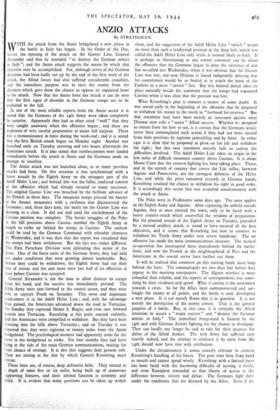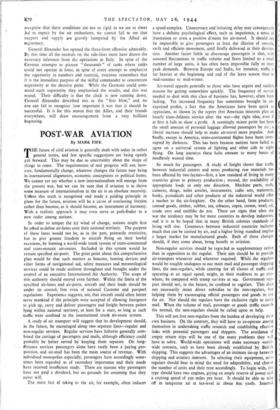ANZIO ATTACKS
By STRATEGICUS
WITH the attack from the Anzio bridgehead a new phase in the battle in Italy has begun. In his Order of the Day, before the opening of the attack on the Gustav Line, General
Alexander said that he intended " to destroy the German armies in Italy"; and the Anzio attack suggests the means by which that objective may be accomplished. For, although seven of the German divisions had been badly cut up by the end of the first week of the attack, the Allied forces had also suffered considerable casualties, and the immediate purpose was to eject the enemy from the defences which gave them the chance to oppose an organised front to the attack. Now that the Anzio force has struck it can be seen that the first signs of disorder in the German troops are to be exploited to the full.
In one of the most reliable reports from the Anzio sector it is stated that the Germans of the i4th Army were taken completely by surprise. Apparently they had so often cried "wolf " that they were caught unawares when the offensive began ; and there are evidences of very careful preparation to attain full surprise. There was a reconnaissance in force during the week-end ; and it is stated that the first British attack began on Monday night. Another was launched early on Tuesday morning and two hours afterwards the Americans struck. It is also stated that reinforcements were landed immediately before the attack at Anzio and the Germans made no s attempt to interfere.
The Anzio attack was not launched alone, as so many previous attacks had been. On this occasion it was synchronised with a heavy assault by the Eighth Army on the strongest part of the Adolf Hitler Line ; and behind this was the fuller, confused context i of the offensive which had already secured so many successes. The original Gustav Line was breached by the brilliant advance of
D the French in three days. The mountain troops pierced the barrier
s of the Arunci mountains with a swiftness that disconcerted the
e Germans ; and, three days later, the battle for, the Gustav Line was drawing to a close. It did not end until the encirclement of the Cassino position was complete. The heroic struggles of the Poles in the hill positions above Cassino enabled the Eighth Army at length to strike up behind the troops in Cassino. The outlook could be read by the German Command with tolerable clearness by Wednesday, and it was then that the report was circulated that the troops had been withdrawn. But the fact was rather different. The First Parachute Division were defending this sector of the front. One of the finest units of the German Army, they had held out under conditions that were growing almost intolerable. But, before they could be withdrawn, the Eighth Army had cut their line of retreat and the unit must have lost half of its effectives at least before Cassino was occupied.
General Alexander is not the man to allow chances to escape from his hand, and the success was immediately pressed. The Fifth Army were sent forward in the coastal sector, and they were able to capture Fondi on Saturday. This town and important road-centre is in the Adolf Hitler Line ; and, with the advantage thus gained, the Americans advanced down the road to Terracina. On Sunday they captured Monte S. Biagio, and even sent forward patrols into Terracina. Kesselring at this point reacted violently, and the Americans were compelled to withdraw. But they have been pressing into the hills above Terracina ; and on Tuesday it was reported that they were eighteen or twenty miles from the Anzio bridgehead. The psychological moment had apparently come for the force in the bridgehead to strike. For four months they had been lying at the side of the main German communications, waiting for their chance of revenge. It is this that suggests their present role. They are aiming at the line by which General Kesselring must r,Areat.
These lines arc, of course, deep defensive belts. They extend to
depth of some five or six miles, being built up of numerous ,11pporting features, and -their normal function is economy and delay. It is evident that many positions can be taken up within
them, and the suggestion of the Adolf Hitler Line " switch " means no more than such a readjusted position in the deep belt, which was
called the Adolf Hitler Line only while it seemed likely to hold. It is perhaps as illuminating as any enemy comment can he about the offensive that the Germans began to deny the existence of any line so-called last Wednesday, when it was obvious that the Gustav Line was lost, and now Dittmar is found indignantly denying that his countrymen would be so foolish as to attach the name of the Fuehrer to a mere " switch " line. But this belated denial takes its place naturally beside the statement that the troops had evacuated Cassino when it was clear that the position was lost.
What Kesselring's plan is remains a matter of some doubt. It was stated early in the beginning of the offensive that he proposed to withdraw his troops to the north to " husband his reserves." But that statement may have been merely an insurance against what Dittmar now calls a "major " Allied success. Whether he designed to retreat from the first or not, it is certain that the Germans would never have contemplated such action if they had not been ejected from their positions by superior generalship and by force. In either case it is clear that he proposed to pivot on his left and withdraw his right ; but this 'easy statement entirely fails to convey the difficulties involved. The Adolf Hitler Line takes its origin in the few miles of difficult mountain country above Cassino. It is about Monte Cairo that the sternest fighting has been taking place. There, and in the stretch of country that covers the Liri valley, between Aquino and Pontecorvo, are the strongest defences of the Hitler Line, and while the pivot remained securely in German hands, Kesselring retained the chance to withdraw his right in good order. It is accordingly this sector that was assaulted simultaneously with the attack at Anzio.
The Poles were in Piedimonte some days ago. The same applies to the Eighth Army and Aquino. After capturing the airfield outside Aquino, they at once entered the town, only to be faced with a heavy counter-attack which counselled the wisdom of preparation. But the planned assault of the Eighth Army on Tuesday, preceded by a massed artillery attack, is stated to have secured all the first objectives, and it seems that Kesselring has now to contrive to withdraw his Tenth Army under very severe handicaps. The air offensive has made the main communications insecure. The tactical co-operation has interrupted these immediately behind the battle- front, and now the French in the neighbourhood of Pico and the Americans in the coastal sector have further cut them.
It will be realised that comment pn this moving battle must limp behind the facts. The communiques are two days late before they appear in the morning newspapers. The Algiers wireless is more colourful than reliable, and the reports of correspondents lose some- thing by their vividness and speed. What is certain is the movement towards a crisis. So far the Allies have outmanoeuvred and out- fought the enemy at all points, and the battle is now developing a new phase. It is not merely Rome that is in question. It is not merely the destruction of the enemy armies. That is the general purpose of a battle. But, in this case, it is certainly the Allied intention to secure a "major success" and " destroy the German armies in Italy." The immediate foreground is formed by the 14th and loth German Armies fighting for the chance to disengage. They can hardly any longer be said to take for their purpose the defeat of the Allied Armies. The roth Army has suffered very heavily indeed, and the attempt to reinforce it by units from the 14th should now have met with retribution.
Under the circumstances it seems scarcely relevant to criticise Kesselring's handling of his forces. The poor man lives from hand to mouth and cannot spend wisely. Kesselring with a limited force has been faced with the increasing difficulty of moving it freely, and even Xenophon reminded us that liberty of action is the difference between victory and defeat. The Germans fight here under the conditions that are dictated by the Allies. Even if we recognise that these conditions are not so rigid as we are at times Jed to expect by the air enthusiasts, we cannot fail to see that support and supply are gravely hampered by the Allied air tatpremacy. • General Alexander has opened the three-front offensive admirably. By this time all the neutrals on the side-lines must have drawn the necessary inference from the operations in Italy. In spite of .the German attempts to picture " thousands " of tanks where tanks could not operate in force, in spite of every attempt to emphasise the superiority in numbers and material, everyone remembers that it is the immediate purpose of the skilful commander to concentrate superiority at the decisive point. While the Germans could com- mand 'such superiority they emphasised the results, and this was sound. Their difficulty is that the clock is now running down. General Alexander described this as the " first blow," and no one can fail to recognise how important it was that it should be successful. It is for this reason that the Allies, and their friends everywhere, will draw encouragement from a very brilliant beginning.



























 Previous page
Previous page